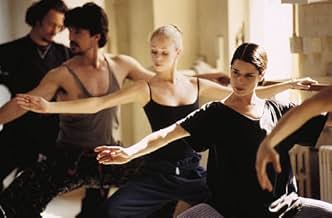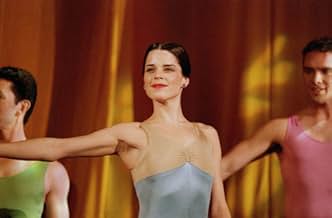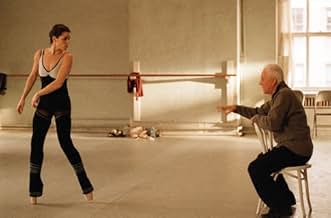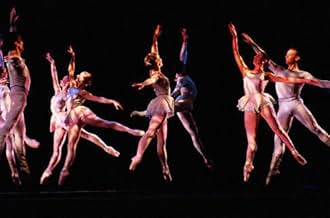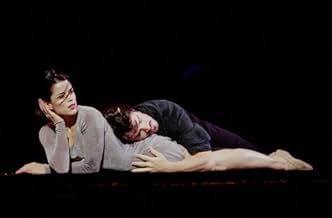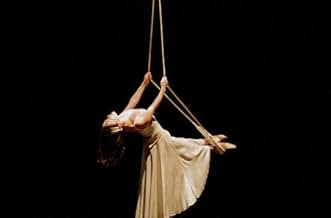IMDb RATING
6.2/10
7.1K
YOUR RATING
A young ballet dancer is poised to become the principal performer in a group of ballet dancers.A young ballet dancer is poised to become the principal performer in a group of ballet dancers.A young ballet dancer is poised to become the principal performer in a group of ballet dancers.
- Director
- Writers
- Stars
- Awards
- 2 nominations total
Barbara E. Robertson
- Harriet
- (as Barbara Robertson)
Davis C. Robertson
- Alec - Joffrey Dancer
- (as Davis Robertson)
- Director
- Writers
- All cast & crew
- Production, box office & more at IMDbPro
6.27.1K
1
2
3
4
5
6
7
8
9
10
Featured reviews
You'd better be really into dance
If you're a devoted fan of ballet or modern dance, you'll enjoy "The Company." Neve Campbell is Ry, a young ballerina and the focal point of the movie, which is an almost documentary-like portrayal of a professional ballet company preparing for and delivering spectacular dance performances in Chicago. Campbell is a former professional dancer, so she brings authenticity to her performance. However, despite the casting of Malcolm McDowell as an authoritarian, acid-tongued company director to provide a potential source of dramatic conflict with Campbell's character, there's very little story or dialogue in the whole film. Some of the dialogue is so quiet and natural that you can't really make it out. Directed by the great Robert Altman, "The Company" focuses mostly on dance performances and grueling practices, with a few cliches thrown in (the dancers' struggles to win roles, please the choreographer and make ends meet financially). It all looks very realistic and beautiful, and the drama is only in the dance. There's a sweet, slight love story for Ry and her equally hard-working chef beau, played by James Franco. So enjoy "The Company" on a quiet evening, glass of wine in hand, if you love to watch good dance performances, but not if you want dialogue or plot. Still, kudos to Neve Campbell for getting such a tasteful, lovely, non-commercial movie made.
This movie was awesome
George, what I think you meant to say was that you are actually a thick-headed mocho-man who has NO appreciation for the arts whatsoever. If you did, you'd understand that the ballet dancing in this movie was beautiful, and entitled a lot of hard work on the dancers' part. I've danced since I was three, and have met many male dancers along the way, and, to inform you, NOT ONE OF THEM WAS GAY! I'm a STRAIGHT female who has dated a male dancer before. Assumptions like that are completely childish. THe acting, dancing, setting, and costumes in this movie were wonderful. If you can't even appreciate fine movie-making, then you are surely at a loss. Even if you would rather be watching sports, which I completely understand, most men would, that's fine: however, it doesn't give you the right to judge an a form of art that you abviously don't understand.
The Blue Snake Bites
I'm no dance critic, but. . . I was very disappointed with the choice of "The Blue Snake" as the ultimate and climactic "number" in "The Company". To me, it really stood out as the least interesting and most cliched of all the dances in the film. Those outrageous costumes! That "Ice Capades" choreography! Altman & Co. really ought to have chosen a piece that would have shown the Joffrey's more adventuresome side.
I went into this film knowing that it was a "dance movie" with minimal storyline, and I was still disappointed. It's not a good sign when I start looking at my watch halfway through a film. It doesn't bother me that a "dance film" eschews the Melodrama of "The Turning Point" or "A Chorus Line." But "The Company" also eschews Interest! There was basically nothing to "hang onto" outside the dance sequences. Only Ry (Neve Campbell's character) was given any appreciable screentime, and aside from a few quiet moments, she wasn't given very much to do.
Okay, I admit that I liked one dramatic scene a lot: a flirtatious moment between Ry and Josh - the chef who looks like a male model - which takes place in a dive bar. There should have been more scenes like that.
I rate the film a 6 - dramatically disappointing, while the quality of the dance sequences varies from sublime to ridiculous.
I went into this film knowing that it was a "dance movie" with minimal storyline, and I was still disappointed. It's not a good sign when I start looking at my watch halfway through a film. It doesn't bother me that a "dance film" eschews the Melodrama of "The Turning Point" or "A Chorus Line." But "The Company" also eschews Interest! There was basically nothing to "hang onto" outside the dance sequences. Only Ry (Neve Campbell's character) was given any appreciable screentime, and aside from a few quiet moments, she wasn't given very much to do.
Okay, I admit that I liked one dramatic scene a lot: a flirtatious moment between Ry and Josh - the chef who looks like a male model - which takes place in a dive bar. There should have been more scenes like that.
I rate the film a 6 - dramatically disappointing, while the quality of the dance sequences varies from sublime to ridiculous.
The Long Hello
Lets hope that Altman makes films for another 20 years and that he stays as adventuresome as he currently is.
In 'The Long Goodbye' Altman invented a rather new camera stance, literally asking the actors to improvise staging and having the camera discovering them.
It took a few decades for him to get back to such experiments with 'Gosford.' Now he takes it even further with perhaps the purest problem in film cinematography: how do you film dance?
Forget that this features Campbell in a vanity role: she is good enough and doesn't detract. Forget about any modicum of plot: there isn't any. And unlike 'Nashville' or the similarly selfreferential 'Player' there is no cynical commentary.
The commentary itself is selfreferential this time. Yes, this time the center of the film is how 'Mr A' orchestrates movement and images. This is most of all about himself, and is far, far more intelligent and subtle than say, 'Blowup.'
But along the way, you get possibly the best dance experience on film. That's because they've been able to use many cameras. There are not as many as 'Dancer in the Dark,' but each camera dances, engages with the dance and the dance of people and objects around the dance. So we get four layers of dance: the actual ballet, the orchestration of people around the production, the dancing cameras (enhanced by non-radical appearing radical editing) and the dance within the mind of Mr A who encourages, follows and captures them all.
Ted's Evaluation -- 3 of 3: Worth watching.
In 'The Long Goodbye' Altman invented a rather new camera stance, literally asking the actors to improvise staging and having the camera discovering them.
It took a few decades for him to get back to such experiments with 'Gosford.' Now he takes it even further with perhaps the purest problem in film cinematography: how do you film dance?
Forget that this features Campbell in a vanity role: she is good enough and doesn't detract. Forget about any modicum of plot: there isn't any. And unlike 'Nashville' or the similarly selfreferential 'Player' there is no cynical commentary.
The commentary itself is selfreferential this time. Yes, this time the center of the film is how 'Mr A' orchestrates movement and images. This is most of all about himself, and is far, far more intelligent and subtle than say, 'Blowup.'
But along the way, you get possibly the best dance experience on film. That's because they've been able to use many cameras. There are not as many as 'Dancer in the Dark,' but each camera dances, engages with the dance and the dance of people and objects around the dance. So we get four layers of dance: the actual ballet, the orchestration of people around the production, the dancing cameras (enhanced by non-radical appearing radical editing) and the dance within the mind of Mr A who encourages, follows and captures them all.
Ted's Evaluation -- 3 of 3: Worth watching.
Lessons in Passive Aggressiveness and how not to care about Characters
Ugh. The problem with The Company is that it's not a Robert Altman film. His touch is evident in the filmmaking and fly-on-the-Wall feel of the movie, but it's not his movie. It's Neve Campbell's, who wrote, produced, and starred in it. Campbell spent years with the national ballet and this movie was a labor of that passion. However, that is precisely where it goes wrong. It shoots for the wrong audience. Dancers will likely love this movie but they are the choir. They know how a dance company works, the back dealing and politics. They don't need this movie. The rest of us don't learn anything, or at least learn just enough to know that professional dancing is a horrible way to live. The dancing was beautiful, including Neve's, although she doesn't look quite as polished as her back ups in the company, but the characters were shallow and you are never given anything to grab onto to care about any of them. The only ones you root for the ones who are injured or fired so they can get out of that horrible horrible place. Such a disappointment on so many levels. The only thing that does come off well is the Joffrey. You actually leave the theater wondering if the Ballet company underwrote the production as a marketing expense.
Did you know
- TriviaNeve Campbell lost thousands of dollars of her own money to ensure that her fellow cast members received their wages.
- GoofsAt about 1:10 while counting during a rehearsal, Harriet skips the 6th count of 8.
- Quotes
Alberto Antonelli: Ry, honey, let's scramble some ideas, instead of some asshole who contradicts me.
- Crazy creditsAfter the closing credits begin rolling, the dancers continue to take their final bows, and the audience continues to applaud.
- How long is The Company?Powered by Alexa
Details
- Release date
- Countries of origin
- Official sites
- Language
- Also known as
- Kumpanya
- Filming locations
- Production companies
- See more company credits at IMDbPro
Box office
- Budget
- $15,000,000 (estimated)
- Gross US & Canada
- $2,283,914
- Opening weekend US & Canada
- $93,776
- Dec 28, 2003
- Gross worldwide
- $6,415,017
- Runtime
- 1h 52m(112 min)
- Color
- Sound mix
- Aspect ratio
- 2.35 : 1
Contribute to this page
Suggest an edit or add missing content







